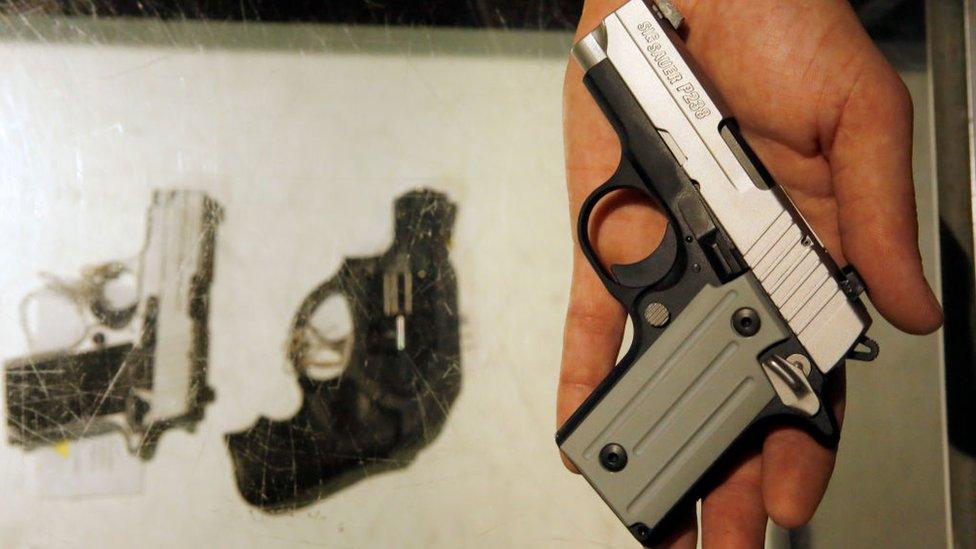AR-15: The lethal weapon at heart of US gun debate
- Published
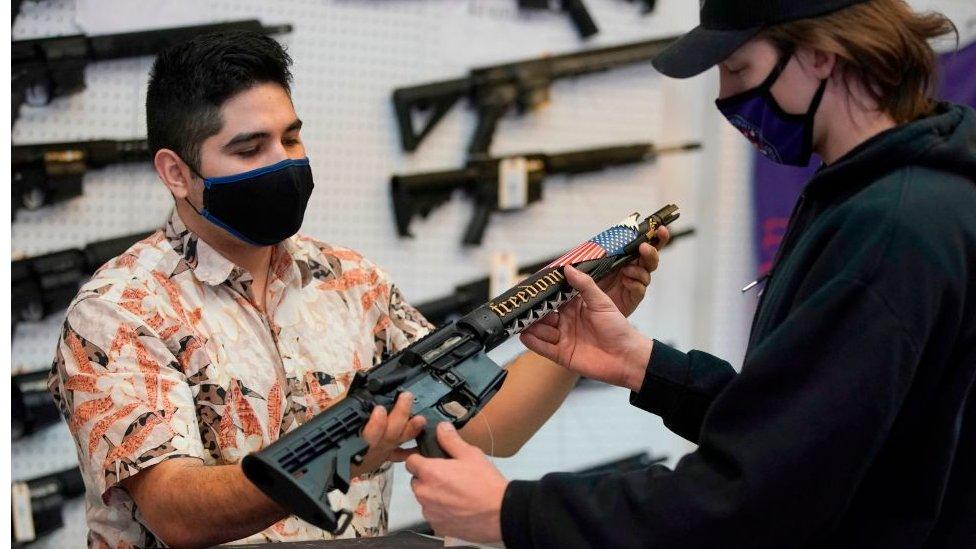
Tens of millions of AR-15 rifles and similar variants are in the hands of US gun enthusiasts
When it comes to America's vast gun culture, no weapon has become as ubiquitous - or controversial - as the AR-15, a gun that is both lauded as "America's Rifle" and vilified as the weapon of choice for mass shooters.
The gun, early versions of which became available in the 1950s, is one of the most popular among American gun owners, with tens of millions currently in circulation. By some estimates, one in 20 Americans owns one. The popularity of the gun even prompted some conservative lawmakers to try to officially designate the AR-15 "the National Gun of the United States".
The semi-automatic AR-15, however, has also become a familiar sight at the scene of mass shootings, including recent deadly incidents in Louisville, Nashville and Uvalde, Texas. Statistics show that AR-15-style weapons have been used in many of the deadliest mass shootings in the US.
But what exactly is an AR-15, and why are they so common?
The history of AR-15s
The AR-15 was first developed as a semi-automatic rifle for civilians in the 1950s by Armalite, a US firm after which the "AR" is named. In 1959, the design of the weapon was sold to another company, Colt, which soon adapted it into a military, fully automatic version known as the M-16.
The weapon first entered frontline service with the US Army in the mid-1960s, in the early stages of the Vietnam War. While the rifle was initially unpopular among US troops because of frequent jamming issues, production was expanded and in 1969, a modified version - the M16A1 - became the standard service weapon across the US military.
After the Vietnam War ended, Colt began marketing semi-automatic versions of the rifle to US gun enthusiasts and police forces alike, although many gun owners remained wary of the weapon.
Colt's patent for the AR-15 expired in 1977. After that, other firearms manufacturers - such as Remington, Smith & Wesson and Ruger - began producing their own versions.
Colt still holds the trademark to the term "AR-15" and other manufacturers' versions go by different names, but these rifles are still popularly referred to as AR-15s.
While the manufacture, sale and possession of some of these guns was restricted under a US federal ban on semi-automatic assault weapons that was in place between 1994 and 2004, the ban didn't apply to weapons made before 1994.
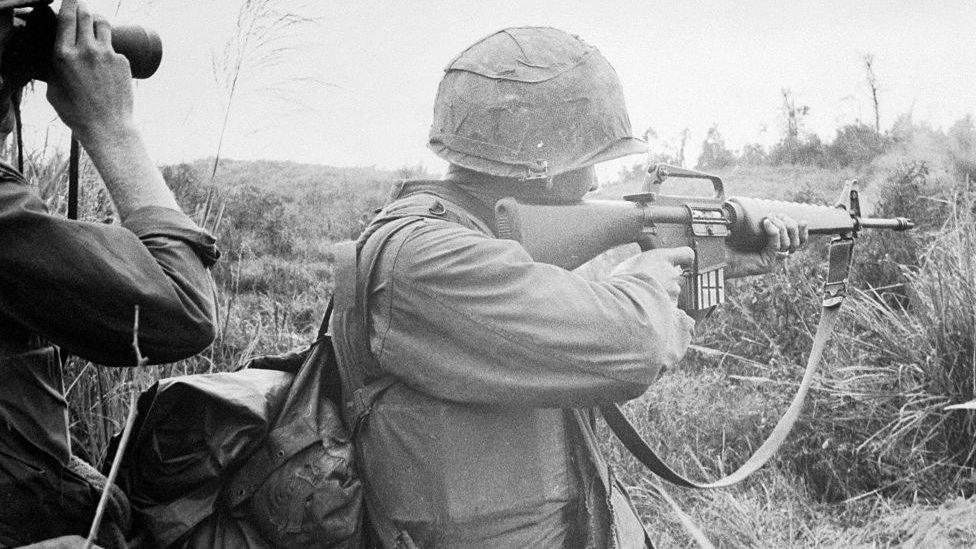
Based on the AR-15, the M-16 rifle saw extensive combat service in Vietnam in the 1960s and early 1970s.
How many Americans own AR-15s?
While the exact number of AR-15s in American hands is difficult to determine, data shows that tens of millions are in circulation across the country.
A late 2022 poll, external from the Washington Post and Ipsos, for example, found that of US gun owners - who constitute 31% of adults - about 20% own AR-15s.
These figures, the Washington Post has reported, external, suggest that as many as one in 20 - about 6% - of Americans owns an AR-15.
Separate statistics, external, compiled by researchers from Georgetown University in 2021, found that 24.6 million Americans own AR-15-style rifles.
The data suggested that since many gun owners have multiple weapons, the total number of AR-15s in American hands could be as high as 44 million.
'A million configurations'
Gun enthusiasts point to a number of reasons for the AR-15's popularity in the US, including its relatively light weight - about 6.5 lbs (3kg) - as well as its ease of use and the ability to customise it with various accessories and additions.
"There are literally over a million configurations, and parts and colours," Christ Waltz, the President and CEO of the AR-15 Owners of America told the BBC. "People talk about it being a Barbie doll for men. You could have different outfits for Barbie, and it's the same with an AR-15 rifle.
"It's also just very easy to shoot. It's lightweight and it's very accurate," Mr Waltz added. "It's simple to use for women and kids when they're involved in shooting sports...it's America's modern sporting rifle. That's what we call it."
Like many enthusiasts, Mr Waltz - who was first exposed to the M-16 as a young Marine in the 1980s - refers to AR-15s as sporting rifles as opposed to "assault weapons", the term often used by gun control advocates.
Scholars who study the proliferation of AR-15s point to several other factors, including pent-up demand dating back to the assault weapons ban and a vast increase in marketing over the last 20 years.
"It became very, very lucrative. AR-15s were cash cows for gun sellers," said Jonathan Metzl, a professor of sociology at Vanderbilt University who researches gun violence. "AR-15 ownership became kind of an identity. There's a lot of examples of people who pushed back on this from within gun culture who got pushed out, including politicians or media commentators."
Additionally, Professor Metzl said that pointed to a marked change over time in why Americans own firearms.
"In the 1970s, 1980s and early 90s, people thought that guns were for hunting, or for tradition," he said. "But when increasing numbers of people thought that they owned firearms for protection against criminals or for property protection, all of a sudden they wanted the most lethal hardware they could get their hands on."
AR-15s in mass shootings
Detractors of the AR-15 often point to the use of the rifle and similar variants during mass shootings across the US.
One set of statistics, from the Associated Press, USA Today and the Northeastern University Mass Killing Database, found that AR-15s have been used in ten of the 17 deadliest mass killings in the US that have taken place since 2012.
These incidents include the 2017 mass shooting in Las Vegas that left 60 dead, as well as the Sandy Hook Massacre in Newton, Connecticut that killed 26 people - including 20 children.
Another database, external, kept by Mother Jones magazine, suggests that the culprit in the Louisville shooting was the seventh to use an AR-15 in a mass shooting in the last 11 months.
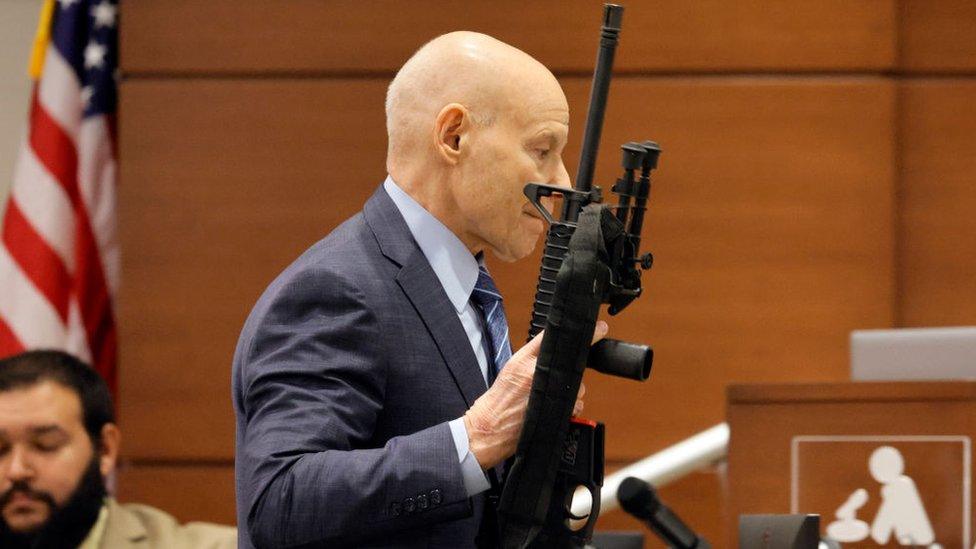
An AR-15 style rifle being shown to jurors during the death penalty trial of Parkland shooter Nikolas Cruz
Gun enthusiasts and gun control advocates alike point to the widespread availability of AR-15-style weapons as among the primary reasons they are so prevalent in mass shootings.
"The availability is there, and the popularity is there," Mr Waltz said, adding that he believes AR-15s are "inanimate objects" and "tools" that are dangerous only in the wrong hands. "It's very unfortunate that this is the gun that's chosen, because it's America's rifle and it's easy to shoot, and we have this problem in society."
Professor Metzl, for his part, said that the simplicity of the weapon that makes it a favourite of enthusiasts also makes it a preferred option for would-be mass murderers.
"If you're trying to kill a lot of people. They're just very effective. You can fire that many bullets per second and at that velocity, it's a perfect killing machine," he said. "There's also a copycat phenomenon."
Data also suggests that purchases of AR-15s spike in the wake of mass shootings, with many enthusiasts fearing changes in legislation that could make it harder to acquire new rifles.
"After shootings, we have a wave of binary conversations. People who believe in gun reform push for legislation, and people on the other side of the aisle use that concern to drive up sales," Mr Metzl said. "There's a concern that there's going to be new legislation and they won't be able to buy."
Related topics
- Published28 March 2023
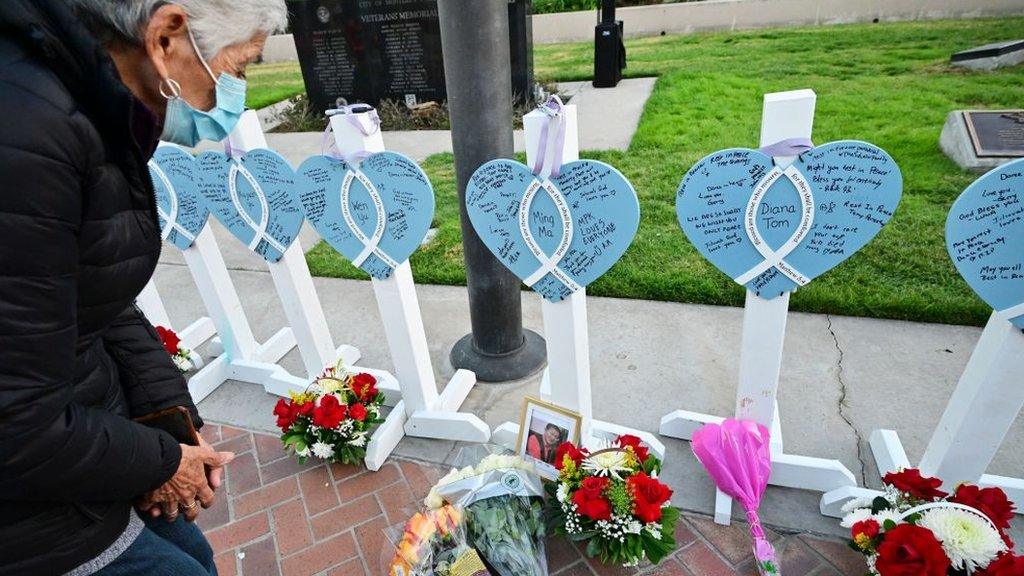
- Published17 December 2024
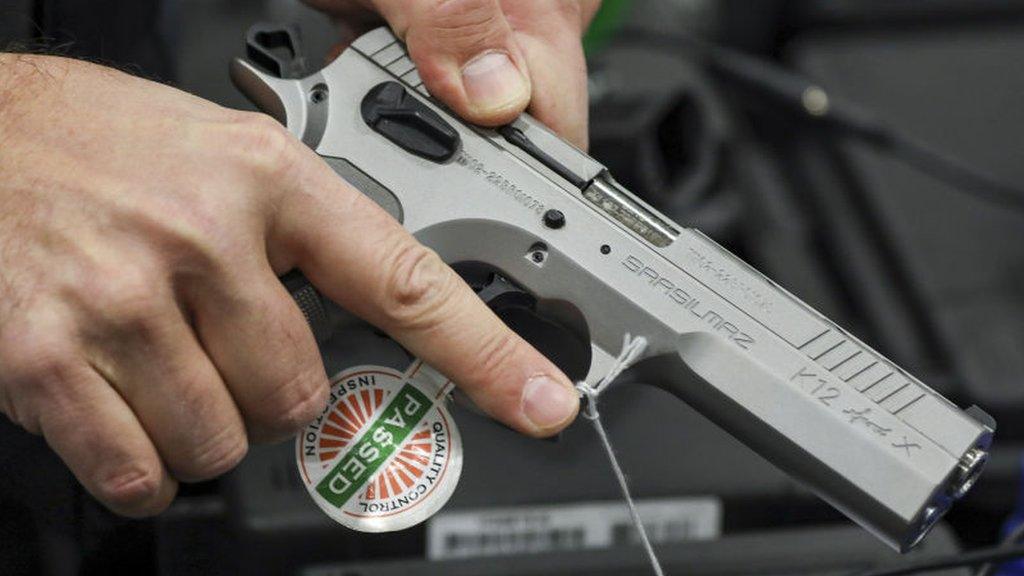
- Published13 April 2023
- Published24 June 2022
